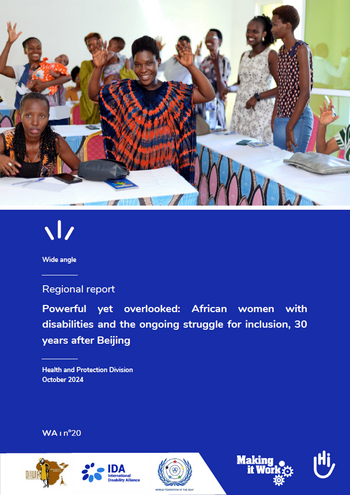share

© Danch20 / HI
24 October 2024 was published the landmark report “Powerful Yet Overlooked: African women with disabilities and the ongoing struggle for inclusion, 30 years after Beijing” at the occasion of the 30-year review of the Beijing Platform for Action.
This report, available in English and French, brings to light the persistent gaps in inclusion, participation, and the protection of the rights of women and girls with disabilities, despite international commitments and national efforts.
It reflects the voices and experiences of 244 women and gender-diverse individuals with disabilities across 23 countries in Africa, drawing on consultations and surveys conducted in collaboration with over 20 women-led organisations of persons with disabilities.
The report was collaboratively authored by a task force comprising Disabled Women in Africa (DIWA), Humanity & Inclusion - Making It Work Gender and Disability project, International Disability Alliance (IDA) and the World Federation of the Deaf (WFD). It opens with an insightful foreword by Gertrude Oforiwa Fefoame.
The Beijing+25 political declaration adopted in March 2020 recognized that “many women and girls experience multiple and intersecting forms of discrimination, vulnerability and marginalization throughout their life course, and that they have made the least progress [in gender equality], which may include, inter alia, [...], women with disabilities”.
5 years later, the facts confirm that not much has been improving when discussing gender equality for women with disabilities.
61% of the women respondents reported that they are not treated equally with men with disabilities in social settings and when seeking support services; 78% of the respondents confirmed that they are less likely to be treated on an equal basis with women without disabilities.
Women represent up to three-quarters of persons with disabilities in low- and middle- income countries. And 1 in 5 women has a disability.
Yet, thirty years after the adoption of the Beijing Declaration and Platform for Action (BPfA), enhanced protection through international and regional frameworks including the Convention on the Rights of Persons with Disabilities (CRPD), the Protocol to the African Charter on Human and Peoples’ Rights on the Rights of women in Africa (the Maputo Protocol) and the Protocol to the African Charter on Human and Peoples’ Rights on the Rights of Persons with Disabilities (the African Disability Protocol), the promises of gender equality remain unfulfilled for African women and girls with disabilities.
Download the report in English: “Powerful yet overlooked”
Download the report in French: “Puissantes mais ignorées”









HI is an independent and impartial aid organisation working in situations of poverty and exclusion, conflict and disaster. We work alongside people with disabilities and vulnerable populations, taking action and bearing witness in order to respond to their essential needs, improve their living conditions and promote respect for their dignity and fundamental rights.
HI is an independent and impartial aid organisation working in situations of poverty and exclusion, conflict and disaster. We work alongside people with disabilities and vulnerable populations, taking action and bearing witness in order to respond to their essential needs, improve their living conditions and promote respect for their dignity and fundamental rights.